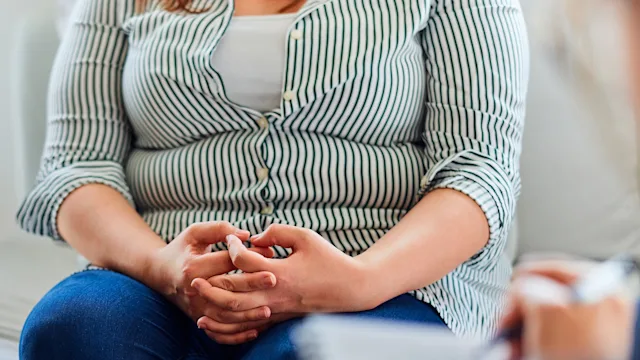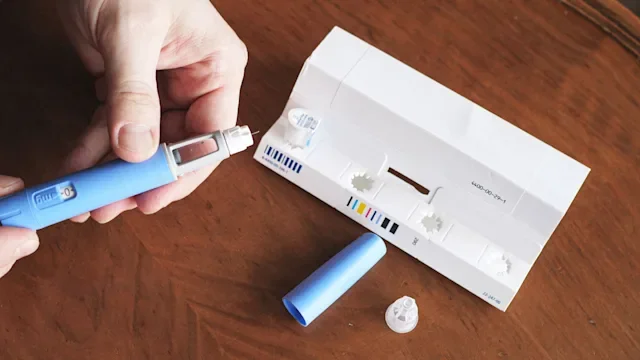Key takeaways:
Courtney DuBois Shihabuddin started taking Wegovy to lose weight after a cancer diagnosis.
She says it quieted “food noise” that used to make her think about food all the time and overeat.
Food is no longer the reward or emotional salve it once was, she says.
Save on related medications
Looking back, the “food noise” was always there.
Those constant thoughts and ruminations about food? Courtney DuBois Shihabuddin had them.
Courtney, a 38-year-old nursing professor and nurse practitioner in Columbus, Ohio, says she was always thinking about the next meal or snack. She often saw food as a reward or a salve.
Search and compare options
“I’m an emotional eater,” she says. “I tend to kind of binge when I have these emotional ups and downs.”

Ups and downs included cancer treatment
And there were plenty of those for Courtney, whose husband is an emergency room physician. She is also raising two young boys, ages 5 and 8.
A few years ago, in February 2020, just as the pandemic was beginning, she got a devastating diagnosis. At just 35 years old, she was diagnosed with breast cancer.



Her treatment included eight surgeries in 3 years, which meant more stress and long periods of time where she couldn’t exercise. She took tamoxifen to block estrogen’s effects on breast tissue and keep her type of cancer from growing. But some people who take tamoxifen, like Courtney, also report gaining weight.
Courtney’s cancer went into remission, and she eventually started The Pink Warrior, an advocacy organization and web store for women battling breast cancer.
But she grew increasingly concerned about her weight.
“At my largest, I got up to 215 pounds, which was the biggest that I had been when I was not pregnant. That was a really tough thing for me,” she says. “When I would go for my primary care appointments, we would have conversations about my BMI [body mass index] and my cardiovascular risk.”
A doctor suggested semaglutide for weight loss
An integrative oncologist noted Courtney had insulin resistance and the risks that go with it. She suggested Wegovy (semaglutide), a weekly shot that acts like a natural hormone called glucagon-like peptide-1 (GLP-1). It helps regulate appetite and food intake.
Courtney, who leads nursing programs at her university, was well acquainted with it. But she hadn’t thought about taking it.
“Let’s try it,” she recalls saying.
After initial insurance denials, she eventually got the medication covered because of her insulin resistance, elevated triglycerides, and body mass index.
It turned off the ‘food as a reward’ switch
Wegovy worked quickly, Courtney says. But what surprised her most was how it altered her desire for food as a reward or emotional salve.
“I started losing weight immediately on the lowest dose. And that was because the food noise was instantly silenced for me,” she says. “I didn’t know the term ‘food noise’ until it went away.”
She lost 3 lbs in the first week. And it continued from there. She was losing 2 lbs to 3 lbs a week. As she increased her dose, she said, “it [the pounds] just melted right off.”


For Courtney, it was a big change.
Losing just a few pounds had been a “tremendous struggle” for much of her life, she says. “Even when I was, you know, eating 1,500 or 1,800 calories a day and restricting, I was constantly fixated on when I could have my next meal.”
Besides the reward aspect of food, she often ate to pass the time. Sometimes she would snack on a sleeve of cookies or bag of chips until it was gone.
“If I was bored, I would eat just because it was something to do. And I didn't realize that it was just the noise in my head telling me, ‘Oh, let’s graze on something,’” she says. “It was an emotional experience for me. You know, food tastes good. I want more of it. I don’t realize that I’m full. I keep eating. It’s this reward system.”
On her medication, she just wasn’t hungry. Nothing in her brain was telling her to go look for food. “It was just silent,” she says.
At first, her lack of appetite meant she wasn’t eating enough to stave off fatigue. That made it hard to exercise. She increased her protein intake and became more conscientious about what she ate.
By early fall 2023, she had lost almost 60 lbs. She started exercising again after figuring out how to eat enough to maintain enough energy throughout the day.
Without ‘food noise,’ eating habits changed
Nowadays, she will often have coffee with a little bit of creamer for breakfast. For lunch, maybe a bowl of Cheerios with some fruit and almond milk or a bagel with turkey. And then for dinner, it might be tilapia with some vegetables.
“But I’m completely satisfied. Not hungry. And if I eat more than that, I’m physically uncomfortable,” she says.
Dinners out with her husband once typically meant sharing an appetizer, getting an entree each, and splitting a dessert. Now, she’ll have an appetizer for a meal and have far less desire for dessert — or alcohol.
Similar to how Wegovy can lessen the reward you get from eating certain foods, it may have a similar effect on alcohol.
“My husband tells me I’m a cheap date now,” she jokes. “We’ll go out, it’s like, ‘You want a glass of wine?’ I’m like, ‘Not really. I’m going to have this crab cake appetizer.’ And he’s like, ‘OK, I’m gonna have the prime rib.’”
She said the absence of food noise, which she attributes to the medication’s impact on the hypothalamus, “that emotional reward center in your brain, " has marked a profound shift.
“It’s so freeing, physically and emotionally,” she says.

Why trust our experts?

















